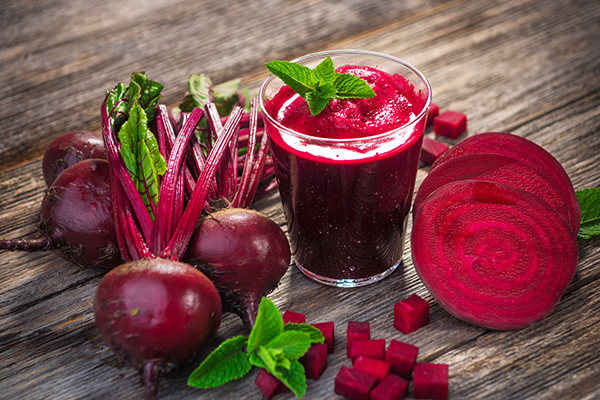Increasing your daily intake of fruits and vegetables can truly help you live longer, reveals study
02/10/2023 / By Zoey Sky

Research has proven that following a nutritious diet is key to maintaining your overall health. According to a study, eating more fruits and vegetables can help you live longer.
Fruits and vegetables contain carbohydrates, dietary fiber and protein. Research shows that they also offer vitamins, minerals, carotenoids and polyphenols that can help protect against chronic diseases like cancer and cardiovascular disease.
The study was published in The Journal of Nutrition.
The link between diet and all-cause mortality
The research team was led by Atsushi Goto, a professor at Yokohama City University, and Hitoshi Nakagama, president of the National Cancer Center Japan. The researchers conducted a 20-year research survey on the link between eating fruits and vegetables and all-cause mortality.
Upon examining data from volunteers, they discovered that those who ate more vegetables and fruits had a seven to eight percent lower risk of death over 20 years, compared to those who consumed fewer vegetables and fruits.
According to Goto, earlier European and American studies had confirmed that “eating more fruits and vegetables can reduce the incidence of cardiovascular disease and the risk of all-cause mortality effectively.”
But the heredity, lifestyle and diet of westerners are different from Asians.
For the Japanese study, scientists selected 95,000 male and female volunteers aged 40 to 69. The volunteers resided in 11 Japanese prefectures and cities between 1990 and 1993.
After excluding people with cancer, cardiovascular disease and liver disorders, the remaining volunteers were chosen for a long-term questionnaire survey. The researchers gathered the results of the questionnaire, then they compiled statistics on the daily fruit and vegetable intake of the participants.
The participants were divided into five groups based on the amount of intake, from highest to lowest. The group with the lowest fruit and vegetable intake was the control group and they were compared to the other groups for subsequent risk of death from all-cause, cancer and cardiovascular and respiratory diseases.
In 2018, 20 years after the study began, the follow-up results revealed that the risk of all-cause death was reduced by at least eight to nine percent in the high fruits and vegetables intake group. Meanwhile, the risk of death from cardiovascular disease was reduced by nine percent.
The analysis of fruit intake found that the risk of all-cause death was reduced by eight percent in the highest intake group while the risk of death from cardiovascular disease was reduced by 13 percent. It was particularly noticeable in the female participants. (Related: Improve your well-being and boost longevity with the Blue Zones diet.)
After reviewing the volunteers’ vegetable intake, the researchers found that the group that consumed the most vegetables had a seven percent lower risk of death than the group that consumed the least.
And when mortality was analyzed separately for the male and female participants, results revealed that higher fruit intake in men was linked to lower respiratory mortality. The same in women was linked to lower cardiovascular mortality.
After studying the result of the analysis, the scientists concluded that fruits and vegetables full of vitamins and dietary fiber have a crucial role in people’s health. They recommended the intake of more than 300 grams (10.5 ounces) of vegetables and more than 140 grams (five ounces) of fruits daily.
“I hope this research result can provide data as a basic reference to the general public about the daily intake of fruits and vegetables,” concluded Goto.
Starchy vegetables don’t offer the same benefits
In another study, researchers from the Harvard T.H. Chan School of Public Health and other institutions examined data from at least 1.9 million people worldwide.
Their findings also showed that consuming an appropriate amount of fruit and vegetable daily can help extend life expectancy. The research results were published in the journal Circulation.
The researchers reported that not all vegetables and fruits can reduce the risk of mortality. Specifically, starchy vegetables like corn, peas and potatoes and some fruit juices aren’t associated with lowering the risk of death from all-cause or certain chronic diseases.
The research team advised that eating green leafy vegetables like kale, lettuce and spinach, berries, citrus fruits and carrots, which are full of beta-carotene and vitamin C, have all shown benefits in reducing the risk of all-cause and cause-specific mortality.
How to eat more fruits and vegetables every day
Eating healthy requires a lot of discipline. If you need help increasing your intake of fruits and vegetables, check out the tips below:
Stock up on healthy snacks
In a 2018 study, scientists compared the food choices people made when given three options:
- An equal number of healthy and unhealthy foods
- More healthy foods
- More unhealthy foods
The results suggest that getting rid of the less healthy options was more likely to result in healthy choices than any other scenario.
While it’s good to eat more fruits and vegetables, eliminating junk food alternatives will also help improve your eating habits.
Start your day with a fruit smoothie
If you don’t like the taste of kale or spinach, you can “hide” the taste by making a fruit smoothie for breakfast.
Add fruits and vegetables to your favorite dishes
If you cook at home, you can increase your intake of fruits and vegetables by adding them to your favorite foods.
For breakfast, you can add fruit to cereal or yogurt. You can also add blueberries or strawberries to pancakes.
Another option is to stuff an omelet with extra vegetables like mushrooms, bell peppers and chopped carrots.
Add more vegetables to a sandwich and add vegetable toppings if you’re having some pizza. When making pasta or your favorite casserole, add leafy greens like spinach or kale.
Do more meal prep
If you’re busy, save time on meal prep by chopping up vegetables in advance and storing them in your fridge. This makes it easier to add more veggies to your meals.
Make a list of your favorite plant-based recipes
You can also save time on meal prep by making a list of your favorite recipes for plant-based dishes.
Before you buy groceries, check your recipes so you can easily buy the missing ingredients. Choose three or four to buy every week.
Prepare vegetarian dishes
Try to make vegetarian dishes at least once a week and prepare a new vegetarian recipe for dinner.
Once you get used to eating meatless dishes, try to prepare vegetarian dishes several times a week.
Enjoy healthy snacks
Instead of gorging on candy and junk food with no nutritional value, enjoy healthy snacks like a piece of fresh or dried fruit. Make sure you buy products without added sugar.
If you prefer something savory, prepare carrot and celery sticks with a low-fat dip or make baked chips with fresh salsa.
Buy canned and frozen produce
If you don’t have access to fresh produce, you can opt for canned and frozen fruits and vegetables, which are just as nutritious as fresh produce. You can also save a bit of money since canned and frozen products are usually more cost-efficient.
Remember to check labels because some canned options can have lots of added sodium or sugar.
Shop seasonally
To make the most of your shopping, buy fruits and vegetables in season. Save money by visiting a farmers market and taking note of which products are in season.
Follow a balanced diet and eat more fruits and vegetables to improve your longevity.
Watch the video below for tips on how to prepare a healthy and delicious salad.
This video is from the Plant Based Eva channel on Brighteon.com.
More related stories:
Study: Strength training for at least 30 to 60 minutes a week helps boost longevity.
Boost longevity with a cup of delicious cold brew coffee (Recipes included).
Walking for 5 minutes every half hour can help you stay healthy if you sit all day, reveals study.
Sources include:
Submit a correction >>
Tagged Under:
aging secrets, diet, food is medicine, food science, fruits, health science, longevity, natural health, natural medicine, nutrition, organics, tips, veggie
This article may contain statements that reflect the opinion of the author
RECENT NEWS & ARTICLES
HealthScience.News is a fact-based public education website published by Health Science News Features, LLC.
All content copyright © 2018 by Health Science News Features, LLC.
Contact Us with Tips or Corrections
All trademarks, registered trademarks and servicemarks mentioned on this site are the property of their respective owners.




















